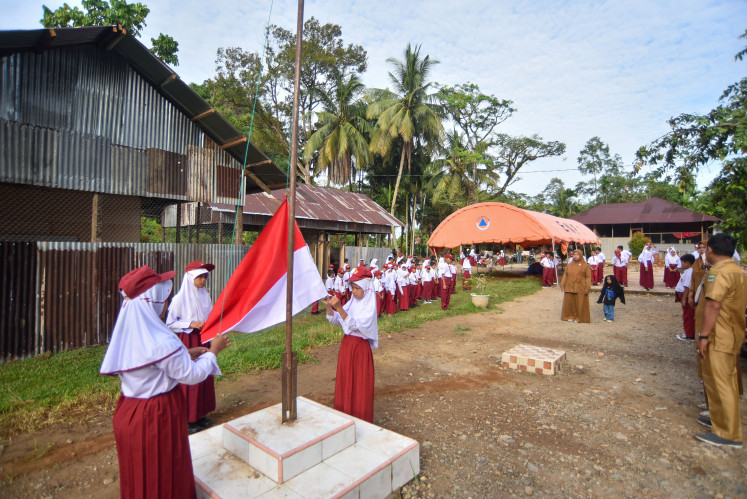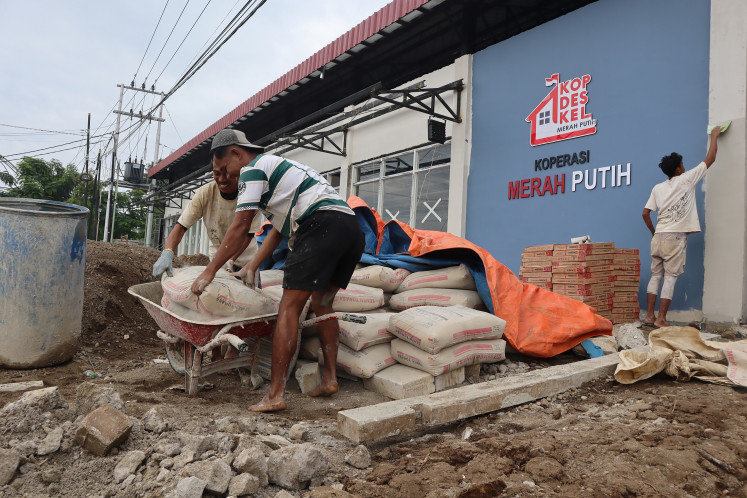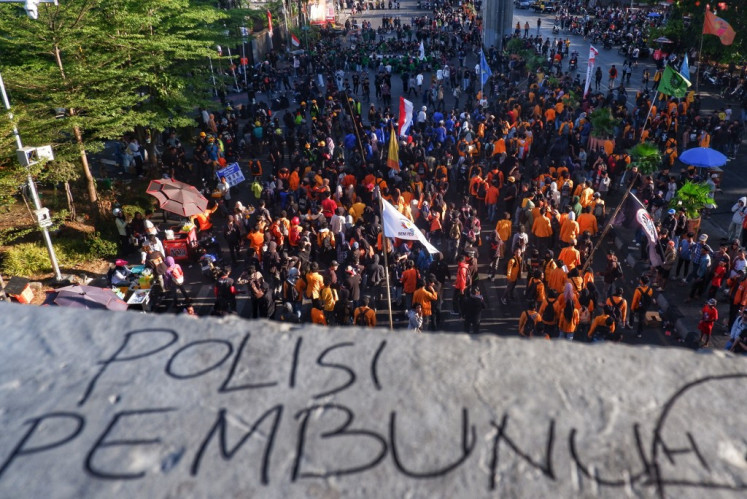Popular Reads
Top Results
Can't find what you're looking for?
View all search resultsPopular Reads
Top Results
Can't find what you're looking for?
View all search resultsSynergy, transformation, innovation
We are grateful that against a backdrop of global economic moderation, Indonesia has maintained a solid economic performance with a promising economic outlook.
Change text size
Gift Premium Articles
to Anyone
T
he global economy has become more unfavorable in 2019. The ongoing trade war between the United States and China and several other countries has continued to escalate, with anti-globalization sentiments taking precedence along with inward-looking policies.
The Brexit issue in the United Kingdom has reached an impasse, while other geopolitical risks continue to emerge. At the same time, economic and financial digitalization is taking place rapidly, bringing with it all the benefits and risks, penetrating various economic segments with control increasingly in the hands of big tech. The current phenomenon of diminishing globalization coupled with increasing digitalization is expected to persist into 2020 and beyond.
We are grateful that against a backdrop of global economic moderation, Indonesia has maintained a solid economic performance with a promising economic outlook. Furthermore, national economic stability has been maintained along with growth momentum. What we have achieved as a country is in contrast to a number of other countries that have experienced recessions or even slipped into crisis.
The solid economic growth achieved in 2019 is projected to accelerate in 2020. Annually, the first three quarters of 2019 recorded economic growth of 5.07, 5.05 and 5.02 percent respectively. Unfortunately, despite the various stimuli introduced, global economic moderation has restricted our ability to expand as expected. Nevertheless, household spending remains stable, supported by low inflation and the government’s social assistance program (Bansos) as well as the growing upper-middle-income class.
Building investment growth remains solid, buoyed by the development of national strategic infrastructure projects. Meanwhile, nonbuilding investment remains sluggish despite the latest survey conducted by Bank Indonesia (BI) point to a rebound in the last quarter of 2019, supported by improvement in business confidence. The export performance has yet to improve due to dwindling global demand and sliding international commodity prices. Moving forward, the policy mix instituted by BI and the government is expected to maintain national economic growth momentum, which BI predicts around 5.1 percent in 2019 before increasing toward 5.1 to 5.5 percent range in 2020.
Indonesia’s balance of payments (BOP) demonstrated maintained external sector resilience despite global economic moderation. The BOP in the third quarter of 2019 was roughly balanced, improved significantly from the deficit of US$2.0 billion in the previous period. The gains stemmed from a smaller current account deficit, which reduced to $7.7 billion or around 2.7 percent of gross domestic product (GDP) in the third quarter of 2019 from $8.2 billion (2.9 percent of GDP) in the second quarter of 2019.
Meanwhile, the capital and financial account surplus increased to $7.6 billion in the third quarter of 2019 from $6.5 billion in the previous period.
The position of international reserve at the end of October stood at $126.7 billion, up from $120.7 billion at the end of 2018, equivalent to 7.4 months of imports or 7.1 months of imports and servicing government external debt, which is well above the international adequacy standard of three months.
Moving forward, the current account deficit is expected to decline to around 2.7 percent of GDP in 2019 and then remain manageable in 2020 in the range of 2.5 to 3.0 percent of GDP, while the capital and financial account surplus remains large, thereby supporting external resilience.
Since the beginning of the year, the rupiah had gained 2.44 percent (year-to-date) as of the end of October. The strong rupiah has been supported by maintained foreign capital inflows together with a well-functioning foreign exchange supply and demand mechanism from the business sector. In addition, less global financial market uncertainty translated into positive sentiment for the rupiah.
Further, BI expects rupiah exchange rate stability in line with the currency’s fundamental value and maintained market mechanisms.
The central bank constantly strives to accelerate financial market deepening, targeting the money market and foreign exchange market. Foreign exchange market development has contributed to increased transaction volume on the forex market as well as convergence of foreign non-deliverable forward (NDF) exchange rate, spot transaction exchange rate, and domestic non-deliverable forward (DNDF) exchange rate.
Low and stable inflation remains under control. Annually, headline inflation in October was recorded at 3.13 percent (year-on-year), unchanged from the level at the end of 2018.
For the year, BI projects inflation at around 3.1 percent in 2019, representing the fifth consecutive year that the inflation target has consistently been achieved, and in the 3.0±1 percent range in 2020.
The growth of outstanding loans disbursed by the banking industry moderated from 11.75 percent year on year in December 2018 to 7.89 percent (yoy) last September, primarily weighed down by limited corporate demand for loans. Therefore BI projects credit growth to reach around 8 percent in 2019 and 10 to 12 percent in 2020, with deposit growth expected to reach around 8 percent in 2019 and 8 to 10 percent in 2020.
Higher economic growth in medium-term is supported by consistent implementation of structural reforms in four main target areas: i) infrastructure development that connects economic zones such as industry, tourism, and micro, small and medium enterprises with distribution networks; ii) deregulation and simplification of bureaucracy to encourage investment and employment; iii) economic transformation from natural resources to competitive manufacturing, and (iv) strengthening the quality of human resources in terms of core competency and advancement of science and technology.
Thus our economy is predicted to grow 5.2 to 5.6 percent in 2021 and increase to 5.5 to 6.1 percent in 2024 with current account deficit declining from 2.5 to 3.0 percent of GDP in 2021 to around 2.3 to 2.8 percent of GDP in 2024. Inflation will be maintained within the range of 2.0 to 4.0 percent until 2024.
BI has relaxed monetary policy in 2019 through policy rate reductions and liquidity injections in the banking industry. Since July, we have lowered the policy rate four times by a total of 100 basis points (bps) to 5 percent.
In addition to increasing bank lending capacity, lower interest rates are expected to stimulate investment and facilitate financing from the corporate sector. To ensure adequate liquidity in the banking industry for lending,BI lowered the rupiah reserve requirement by a further 100 bps to 5.5 percent in June and November. The accommodative monetary policy stance pursued in 2019 will be maintained to 2020.
Accelerating financial market deepening has strengthened the effectiveness of accommodative monetary and macro-prudential policies. The central bank will continue to increase transaction volume and foster the use of various money market and foreign exchange market instruments, including DNDF, interest rate swaps and overnight index swaps as well as commercial papers (SBK).
BI will continue to promote instruments to finance infrastructure in conjunction with the Indonesian government and Financial Services Authority (OJK).
We continue to develop various innovations in terms of infrastructure financing, such as Infrastructure Investment Fund-Collective Investment Contracts (DINFRA), asset-backed securities, project bonds, and green bonds. In October 2018, during the International Monetary Fund-World Bank annual meetings in Bali, private financing was secured for 21 infrastructure projects worth $13.6 billion. In December 2019, we expect to sign private financing for 14 more infrastructure projects to the tune of Rp 53.3 trillion ($3.67 billion).
Bank Indonesia (BI) will continue to direct payment system policy toward supporting electronic and economic efficiency. The noncash payment system electronification programs, currently targeting government social aid program disbursements, transportation modes and the financial operations of various provincial governments will be extended to support public purchasing power and consumption.
Furthermore, the efficiency of retail transaction settlement through the BI National Clearing System (SKNBI) will be improved to accept larger transactions and settle those transactions faster and at a lower cost. Interconnectivity and interoperability in the National Payment Gateway (NPG) will also be expanded.
On the cash side, the efficiency and distribution of currency in circulation will be improved in the archipelago, including remote and frontier regions.
The payment system policy will also focus on supporting the integration of digital economy and finance, including the development of economic and financial inclusion. To that end, BI strengthens digital-based instruments and public infrastructure, particularly in retail payment systems, strengthens financial market infrastructures and the payment ecosystem, and expands the use of noncash instruments for economic and financial transactions.
We develop innovation in payment systems to support the digital economy and finance. To that end, BI has launched the Indonesia Payment System (IPS) Blueprint 2025 with the following five visions:
IPS 2025 reinforces the integration of national digital economy and finance to assure proper functioning of the central bank’s mandate in money creation and circulation, monetary policy and financial system stability as well as to support financial inclusion;
IPS 2025 fosters digital transformation within the banking industry to sustain the bank’s role as a primary institution in the digital economy and finance through the open banking standard as well as the deployment of digital technology and data in their financial product and services;
IPS 2025 assures the inter-linkage between fintech and banks to contain the escalation of shadow-banking risk through regulation of digital technology (such as Application Programming Interface), business relations and business ownership;
IPS 2025 strikes the balance among innovation, consumer protection, integrity and stability as well as fair competition through the digital Know Your Customer, Antimoney Laundering and Combating the Financing of Terrorism, data/information/public business openness, and the deployment of Regtech and Suptech [innovative technologies] for reporting, regulation and supervision;
IPS 2025 safeguards national interest in cross-border use of digital economy and finance through the obligation of domestic processing for all onshore transactions and domestic partnership for all foreign players under the consideration of the reciprocity principle.
The goal is integration of the digital economy and finance to guarantee effective money creation and circulation, monetary policy transmission, financial system stability as well as economic and financial inclusion. A full explanation of the blueprint and the five initiatives are presented in the publication of the Indonesia Payment System Blueprint 2025 entitled “Bank Indonesia: Navigating the National Payment Systems in the Digital Era”.
The first initiative is developing open banking. BI will encourage the banking industry to undertake end-to-end digital transformation to expand digital applications in providing various financial services to the public, including in the retail payment systems. Innovation in retail payments by fintech also continues to be encouraged, including a development program for new start-ups.
Moreover, BI will build and strengthen the interlinkage between fintech and banks. With the industry and other relevant authorities, BI will develop a standardized Open Application Programming Interface, incorporating data, technical, security and governance standards.
In addition to avoiding shadow banking, this initiative will accelerate the development of retail payment systems and open up financing opportunities for micro, small and medium enterprises.
The second initiative is strengthening the configuration of retail payment systems. BI will develop BI-FAST, real time and 24/7 retail payment system infrastructure, in lieu of the current SKNBI.
This infrastructure will be developed into an integrated payment interface as public infrastructure for the retail payment system and simultaneously to address public demand for fast, mobile, secure and low-cost transactions. The initiative includes improving payment system interconnection and interoperability within the NPG and BI-FAST.
The third initiative is strengthening financial market infrastructures. BI is planning to modernize the Real Time Gross Settlement system, Scripless Securities Settlement System and Electronic Trading Platform to third-generation systems, to increase their reliability, both in domestic and cross-border services, while complying with international standards and best practices, namely the Principles for Financial Market Infrastructures.
In addition, BI will accelerate the establishment of money market and foreign exchange market central counterparties.
Fourth, developing public infrastructure for data. BI realizes that data availability, access and protection are important to the development of the digital economy and finance. Through this initiative, BI will develop a data hub as a public infrastructure to manage granular payment transaction data, which will include the development of a payment ID.
The fifth initiative is strengthening the regulatory, licensing and supervisory frameworks. This initiative will guarantee the availability of an integrated regulatory, licensing and supervisory framework to mitigate the risks while fostering innovation for further financial inclusion. This initiative also covers integrated reporting and the utilization of RegTech and SupTech for licensing and supervision, as well as strengthening BI’s sandbox function.
BI will also catalyze the Islamic economy and finance as a new source of economic growth in Indonesia.
BI strengthens the halal value chain ecosystem through empowering the economy of Islamic boarding schools (pesantren). Meanwhile, we will continue to encourage efforts to establish Indonesia as a reference center for the global Islamic economy and finance.
Synergy, transformation and innovation are three keywords in confronting the impact of the diminishing of globalization and the rise of digitalization.
Synergy in macroeconomic and financial system policy mix will be directed toward maintaining stability while optimizing space to boost growth momentum. Policy synergy with the government will be strengthened by controlling inflation through the National Inflation Task Force and the Regional Inflation Task Forces, fiscal and monetary policy, as well as the real sector to improve the current account deficit.
Synergy in terms of maintaining financial system stability will be strengthened through the Financial System Stability Committee.
Furthermore, bilateral coordination between BI with the Indonesian Financial Services Authority (OJK) and Deposit Insurance Corporation will be increased. In addition, BI will coordinate with the Finance Ministry and OJK to accelerate the financial market deepening. Synergy with OJK and government in anti-money laundering and counterterrorism financing will be further strengthened, in particular facing the mutual evaluation process for Indonesia to become a member of the Financial Action Task Force.
System Blueprint 2025 supports integration of the national digital economy and finance. We will continue to encourage digitalization of the banking industry, its interlinkages with fintech, development of regional and national startups as well as the evolution of fast, efficient and reliable payment system infrastructures.
In conjunction with the government, OJK, industry, and associations, BI will cultivate an integrated ecosystem incorporating e-commerce, fintech and open banking, to nurture competitive national unicorns that can accelerate financial and economic inclusion to support Indonesia’s economy for generations to come.
***
Governor of Bank Indonesia (BI). This article is abridged from the governor’s speech at BI’s annual meeting on Nov. 28, attended by President Joko “Jokowi” Widodo.










